初中新概念英语第二册状语从句和特殊句式复习课件(共60张PPT)
文档属性
| 名称 | 初中新概念英语第二册状语从句和特殊句式复习课件(共60张PPT) |  | |
| 格式 | pptx | ||
| 文件大小 | 2.2MB | ||
| 资源类型 | 教案 | ||
| 版本资源 | 新概念英语 | ||
| 科目 | 英语 | ||
| 更新时间 | 2025-05-21 16:25:33 | ||
图片预览

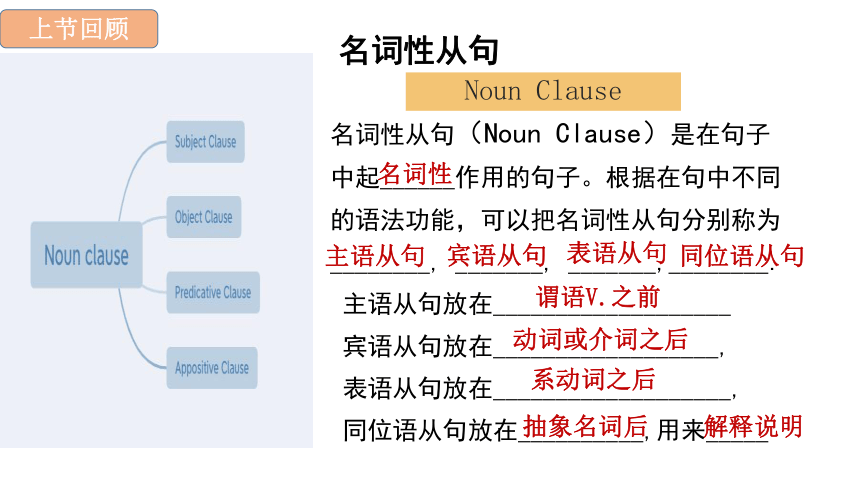
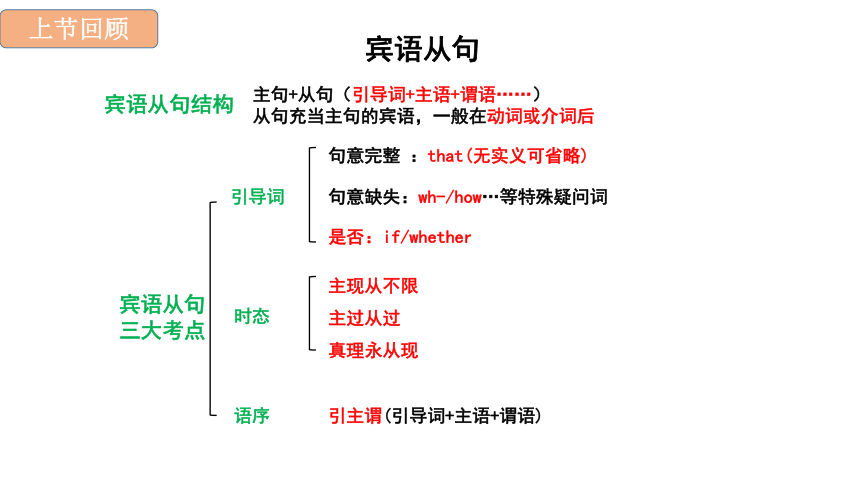
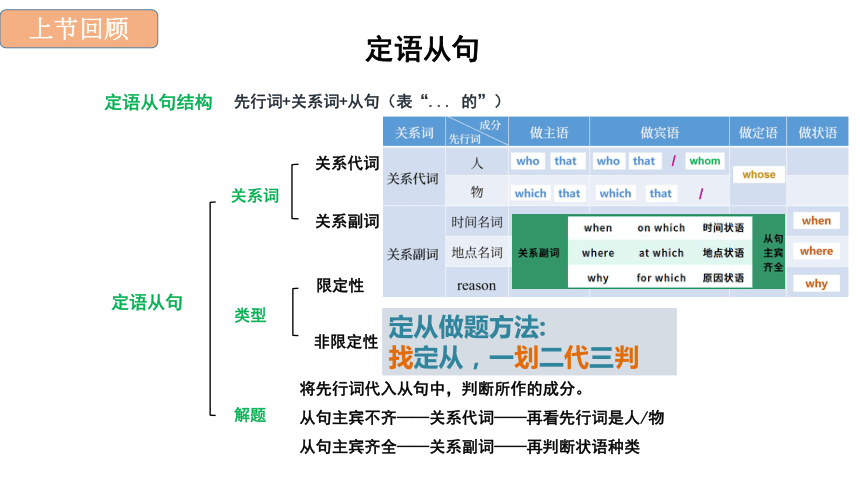
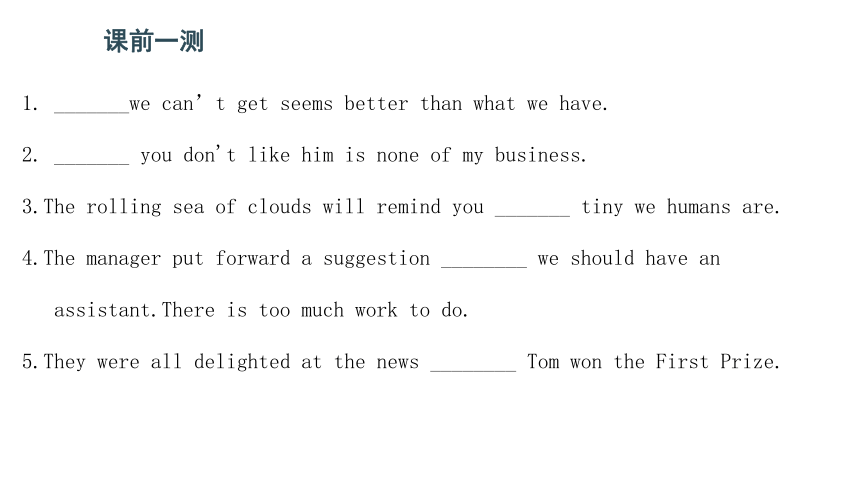
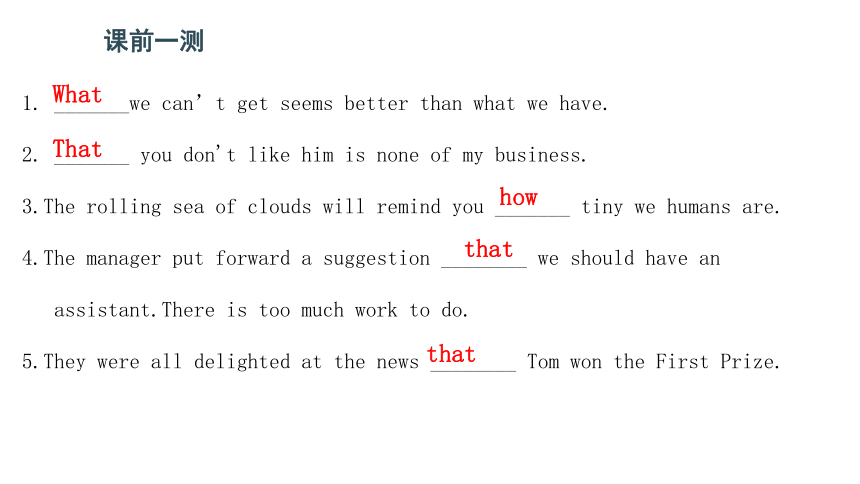
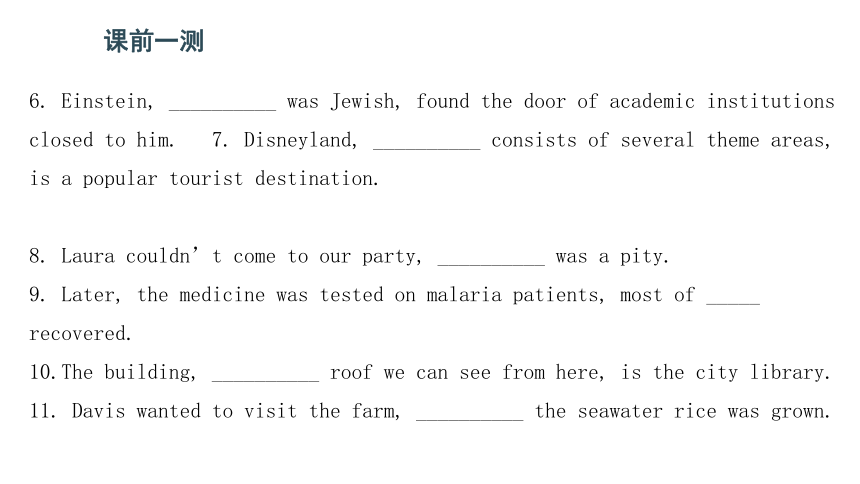

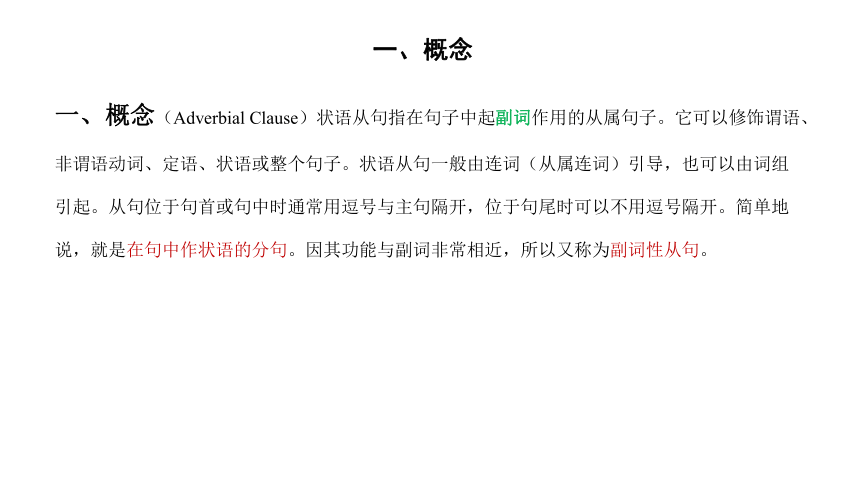
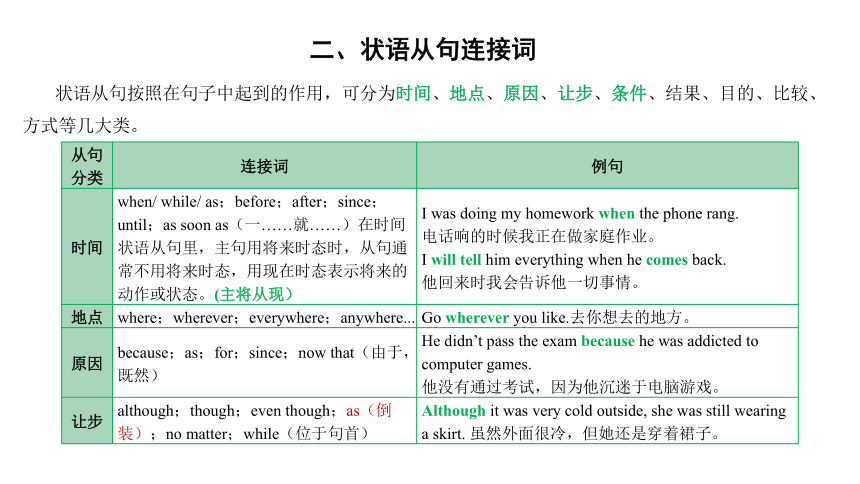


文档简介
(共60张PPT)
状语从句
名词性从句
Noun Clause
名词性从句(Noun Clause)是在句子中起______作用的句子。根据在句中不同的语法功能,可以把名词性从句分别称为________, _______, _______,________.
主语从句放在___________________
宾语从句放在__________________,
表语从句放在___________________,
同位语从句放在__________,用来_____
名词性
主语从句
宾语从句
表语从句
同位语从句
谓语V.之前
动词或介词之后
系动词之后
抽象名词后
解释说明
上节回顾
宾语从句
宾语从句结构
主句+从句(引导词+主语+谓语……)
从句充当主句的宾语,一般在动词或介词后
宾语从句三大考点
引导词
时态
语序
句意完整 :that(无实义可省略)
是否:if/whether
句意缺失:wh-/how…等特殊疑问词
主现从不限
主过从过
真理永从现
引主谓(引导词+主语+谓语)
上节回顾
定语从句
定语从句结构
先行词+关系词+从句(表“... 的”)
定语从句
关系词
类型
解题
关系代词
关系副词
限定性
非限定性
将先行词代入从句中,判断所作的成分。
从句主宾不齐——关系代词——再看先行词是人/物
从句主宾齐全——关系副词——再判断状语种类
定从做题方法:
找定从,一划二代三判
上节回顾
课前一测
1. _______we can’t get seems better than what we have.
2. _______ you don't like him is none of my business.
3.The rolling sea of clouds will remind you _______ tiny we humans are.
4.The manager put forward a suggestion ________ we should have an
assistant.There is too much work to do.
5.They were all delighted at the news ________ Tom won the First Prize.
课前一测
1. _______we can’t get seems better than what we have.
2. _______ you don't like him is none of my business.
3.The rolling sea of clouds will remind you _______ tiny we humans are.
4.The manager put forward a suggestion ________ we should have an
assistant.There is too much work to do.
5.They were all delighted at the news ________ Tom won the First Prize.
how
that
What
That
that
课前一测
6. Einstein, __________ was Jewish, found the door of academic institutions closed to him. 7. Disneyland, __________ consists of several theme areas, is a popular tourist destination.
8. Laura couldn’t come to our party, __________ was a pity.
9. Later, the medicine was tested on malaria patients, most of _____ recovered.
10.The building, __________ roof we can see from here, is the city library.
11. Davis wanted to visit the farm, __________ the seawater rice was grown.
课前一测
6. Einstein, __________ was Jewish, found the door of academic institutions closed to him. 7. Disneyland, __________ consists of several theme areas, is a popular tourist destination.
8. Laura couldn’t come to our party, __________ was a pity.
9. Later, the medicine was tested on malaria patients, most of _____ recovered.
10.The building, __________ roof we can see from here, is the city library.
11. Davis wanted to visit the farm, __________ the seawater rice was grown.
who
which
which
whom
whose
where
一、概念
一、概念(Adverbial Clause)状语从句指在句子中起副词作用的从属句子。它可以修饰谓语、非谓语动词、定语、状语或整个句子。状语从句一般由连词(从属连词)引导,也可以由词组引起。从句位于句首或句中时通常用逗号与主句隔开,位于句尾时可以不用逗号隔开。简单地说,就是在句中作状语的分句。因其功能与副词非常相近,所以又称为副词性从句。
二、状语从句连接词
状语从句按照在句子中起到的作用,可分为时间、地点、原因、让步、条件、结果、目的、比较、方式等几大类。
从句分类 连接词 例句
时间 when/ while/ as;before;after;since;until;as soon as(一……就……)在时间状语从句里,主句用将来时态时,从句通常不用将来时态,用现在时态表示将来的动作或状态。(主将从现) I was doing my homework when the phone rang.
电话响的时候我正在做家庭作业。
I will tell him everything when he comes back.
他回来时我会告诉他一切事情。
地点 where;wherever;everywhere;anywhere... Go wherever you like.去你想去的地方。
原因 because;as;for;since;now that(由于,既然) He didn’t pass the exam because he was addicted to computer games.
他没有通过考试,因为他沉迷于电脑游戏。
让步 although;though;even though;as(倒装);no matter;while(位于句首) Although it was very cold outside, she was still wearing a skirt. 虽然外面很冷,但她还是穿着裙子。
二、状语从句连接词
条件 if;unless;in case that;only if;as long as在条件状语从句里,谓语动词通常用现在时态表示将来的动作或状态。(主将从现) They will go hiking if they are free.
如果他们有空的话,他们会去远足。
结果 so that;so/ such...that... It was so hot that many people went swimming in the sea.
天气太热了,许多人去海里游泳。
目的 so that;in order that;lest;in case... Please speak slowly so that we can follow your thoughts.
请慢慢说,这样我们才能跟随你的想法。
比较 than;as...as... She is as quiet as her mother. 她和她母亲一样安静。
方式 as;as if;how;the way... We must do as the Party tells us.我们必须遵从党的指导。
二、状语从句连接词
(1)状语从句引导词的选择状语从句引导词需要根据主从句之间的逻辑关系进行选择。另外,考生应当熟记引导各类状语从句的连词,考试中常以词义辨析的形式出现。 (2)主将从现,主现从现在时间、条件和让步状语从句中,如果主句表达将来含义,从句用一般现在时代替一般将来时;如果主句是一般现在时,则从句也用一般现在时。【例】I will tell him about it when he comes.他来的时候我会告诉他这件事。(时间) If it is fine tomorrow, we will go outing.如果明天天气好,我们就出门。(条件) Although I’m only a child, I’ll try my best to help you.虽然我只是个孩子,我也会尽我所能帮你。(让步)
二、状语从句连接词
(3)as引导让步状语从句as引导让步状语从句必须倒装,as可以和though互相替换,但although引导时不能倒装,同样,未倒装的让步状语从句也不能用as引导。【例】Try as he might, he couldn’t solve the problem.尽管他想方设法,却未解决这个问题。(V原+as+主语+动词)Successful as he is, he is not proud.他虽然成功,但不骄傲。(形容词+ as+主语+动词)King as he was, he was unhappy.他虽然是国王,但他不幸福。(名词+ as+主语+动词)Fast as you read you, can’t finish the book in two day.尽管你读得很快,也不能两天之内就读完这本书。(副词+ as+主语+动词)
随堂测
【单选】She is one of the top students in her class ______ she studies very hard.
A. because
B. so
C. unless
D. though
随堂测
【单选】She is one of the top students in her class ______ she studies very hard.
A. because
B. so
C. unless
D. though
【解析】考查状语从句引导词,根据句意,明显主从之间是因果关系,四个选项中,只有A选项接原因状语从句,答案选A。
句意:她是班上最优秀的学生之一,因为她学习很刻苦。
随堂测
【单选】You can borrow my book, ______ you promise to give it back to me by the end of this month.
A. as far as
B. as soon as
C. as long as
D. as well as
随堂测
【单选】You can borrow my book, ______ you promise to give it back to me by the end of this month.
A. as far as
B. as soon as
C. as long as
D. as well as
【解析】考查让步状语从句引导词辨析,as far as:到目前为止;as soon as:一……就……;as long as:只要;as well as:既……又……;根据句意,只有C选项符合语境。句意:你可以借走我的书,只要你能在月底还给我。
随堂测
【单选】We’ll have a picnic in the park this Sunday ______ it rains or it’s very cold.
A. since
B. if
C. unless
D. until
随堂测
【单选】We’ll have a picnic in the park this Sunday ______ it rains or it’s very cold.
A. since
B. if
C. unless
D. until
随堂测
【单选】They will hold a party if they ______ the project on time.
A. will complete
B. complete
C. completed
D. had completed
随堂测
【单选】They will hold a party if they ______ the project on time.
A. will complete
B. complete
C. completed
D. had completed
【答案】B
【解析】考查条件状语从句时态,由于主句是将来时态,根据“主将从现”原则,条件状语从句的时态应该是现在时,答案选B。
句意:如果他们按时完成了这个项目,他们将举行派对。
随堂测
【单选】The Internet of the fourth generation is now in the experimental stage. The time will come when it ______ possible for ordinary people to use it in their daily life.
A. is
B. will be
C. must be
D. may be
随堂测
【单选】The Internet of the fourth generation is now in the experimental stage. The time will come when it ______ possible for ordinary people to use it in their daily life.
A. is
B. will be
C. must be
D. may be
【解析】考查时间状语从句时态,根据“主将从现”原则,可排除B选项,C选项“must”过于绝对,排除,D选项表示对现在情况的推测,也不符合语境,故答案选A。
句意:第四代互联网正处于实验阶段。它被广泛用于人们的日常生活将指日可待。
随堂测
【单选】______, Martin can reach the branch of that tall tree at the gate.
A. As a short man
B. Being short
C. As he is short
D. Short as he is
随堂测
【单选】______, Martin can reach the branch of that tall tree at the gate.
A. As a short man
B. Being short
C. As he is short
D. Short as he is
【解析】考查让步状语从句倒装,as引导让步状语从句必须倒装,四个选项中只有D选项符合。句意:尽管马丁很矮,他也能够到门口那棵大树的树枝。
特殊句式
一、强调句
强调是为了加强句子的语气,突出说话的重点,区别不同的意思等。英语书面语中表示强调的手段主要有词汇和语法两种。这里主要介绍通过语法手段实现强调目的的句型。1. It is / was +强调部分+that+剩下部分,被强调的部分可以是主语,宾语,状语或表语。【例】It was on the corner that I ran into a murder.就是在街角,我撞见了一起凶杀。(强调状语) It was he that (who) went to that place at that time yesterday.
昨天那个时候去那个地方的正是他。(强调主语) It was those girls in red dress that he aimed at.他的目标是那些穿红裙子的女孩。(强调宾语) 【注意】此句型不强调谓语。
一、强调句
2. It was not until+被强调的部分+that+剩下部分,that后面的句子要用肯定句以及陈述语气。【例】It was not until she took off her dark glasses that I recognized she was a famous film star.
直到她摘下墨镜,我才认出她是一位著名的电影明星。 3.强调部分为从句或含有从句的情况:(1)强调原因状语时,状语从句只能用because引导,不用as、since、for等。【例】It was because I could speak English that I got the job.因为我会讲英语,所以我得到一份工作。
(2)强调部分含有定语从句【例】It was in the factory (that I visited) that I met my old friend.我是在我参观的工厂里遇见我的老朋友的。
一、强调句
4.强调含有not... but...,not only... but also...,either... or...,neither... nor...,as well as等词组构成的句子。【例】It was neither you nor he that is willing to go to the Great Wall.你和他都不愿意去长城。 It was he as well as his classmates who has ever been to Suzhou.他和他的同学都去过苏州。
5.一般疑问句的强调句式为“Is/Was it +被强调的部分+that/who+其他”。特殊疑问句的强调句式是“特殊疑问词(疑问代词或疑问副词)+is/was it that+陈述句语序”。特殊疑问句中只有疑问词可以被强调。【例】Was it Sally that phoned just now 刚才打电话的人是莎莉吗? When was it that you lost your keys 你究竟什么时候丢的钥匙?
随堂测
【单选】It was the training at college ______ made him such a good writer.
A. as
B. which
C. that
D. what
随堂测
【单选】It was the training at college ______ made him such a good writer.
A. as
B. which
C. that
D. what
【解析】本题考查强调句,其基本结构为:It is / was+被强调部分+that / who+其他。此处强调句子的主语the training at college,连接词应用that。故选C。
句意:正是大学里的训练才让他成为一位如此优秀的作家。
随堂测
【单选】It was _____ the policeman came ______ the parents knew what had happened to their son.
A.before...as
B.until...when
C.not until...that
D.until...that
随堂测
【单选】It was _____ the policeman came ______ the parents knew what had happened to their son.
A.before...as
B.until...when
C.not until...that
D.until...that
【解析】考查强调句:It is / was not until...that...为强调句中的一种特殊结构,强调的是“not until...”结构引导的时间状语。故选C。句意:直到警察来了,这对父母才知道他们的儿子发生了什么事。
二、倒装句
英语句子的基本语序通常是“主语在前,谓语在后”。如果根据需要将谓语动词的全部或一部分放在主语前面,这样的语序被称为倒装句语序。
1.完全倒装
谓语部分完全放在主语之前,叫完全倒装。(1)there位于句首+表移动(come、go、be)或状态(stand、live、lie)的谓语动词【例】There exists some misunderstanding between them.他们之间有点儿误会。 There stands a stone bridge across the river.河上有座桥。(2)表时间/方位/地点的副词或介词短语位于句首,如now,then,here,down,in等,且谓语动词为表移动(come、go、be)或状态(stand、live、lie)的动词【例】Now comes your turn.现在轮到你了。 Through the window came out the sweet music.悦耳的音乐从窗户里传出来。【注意】此句型后主语为代词时不倒装(名倒代不倒)【例】Here you are.给你。
二、倒装句
2.部分倒装
只把be动词、助动词、情态动词提到主语前,叫部分倒装。(1)否定倒装:含否定意义的词位于句首引起部分倒装常见否定词:never,nor,not,seldom,rarely,hardly,few,little...否定短语:句首否定短语at no time,under / in no circumstances,in no case,in no way,on no condition,by no means等。【例】Seldom does he read in his free time.他从不在休闲时间阅读。 By no means can he get there in ten minutes.他决不能在十分钟内到达那里。
(2)only位于句首+副词/介词短语/状语从句【例】Only by shouting did we realize the meaning of this poem. 只有通过呼喊,我们才意识到这首诗的意义。 Only after I left home did I realized how happy I was. 当我离开家以后,我才意识到自己曾经多幸福。 Only when one falls in love can one understand the meaning of it. 一个人只有恋爱了才能理解爱的真谛。
二、倒装句
(3)频度状语位于句首【例】Often have I warned him not to go swimming alone. 我经常警告他不要一个人去游泳。
(4)not... until(不……直到),no sooner... than(一……就),hardly... when(一……就),scarcely... when(刚……就),so... that(如此……以至于),such... that(如此……以至于)句型中,主句倒装,从句语序正常(主倒从不倒)【例】Not until I finished my homework did I go to bed.我直到做完作业才上床睡觉。 No sooner had I got to the station than the train left.我一到车站火车就开走了。 Hardly had we finished our supper when the electricity was cut out.我们刚吃完晚饭就停电了。 So carelessly did he drive that he almost killed himself.他开车如此粗心,差点把他自己害死了。 To such an extent did his health deteriorate that he was forced to retire.
他的健康状况恶化到如此程度,只好被迫退休了。
二、倒装句
3.强调倒装
将要强调的成分(状语/表语/宾语)放在句首引起的倒装。【例】Such are the facts.(表)事实如此。 Across the river lies a newly built steel bridge.(状)新建的一座钢桥横跨这条河流。 What he did I cannot imagine.(宾)我想不出他做了什么。
二、倒装句
4.反复倒装
如果前面所述情况也适用于后者,后面的句子常用so,neither或nor引出倒装句。【例】She has been to New York and so have I. 她去过纽约,我也去过。 Lily has never seen snow; neither/nor has Tom. 莉莉从没有见过雪,汤姆也没有。
二、倒装句
5. as,though引导让步状语从句时的倒装as引导让步状语从句时,从句需倒装,即将表语、状语或动词原形提至句首;当名词置于句首时前面不加任何冠词。though引导让步状语从句可倒可不倒。【例】Strong as the enemy is, we are not afraid.敌人虽然强大,我们却不惧怕。 Child as he is, he knows a lot of things.尽管他还是个孩子,却知道很多事情。
随堂测
【单选】Seldom ______ in such a rude way.
A. we have been treated
B. we have treated
C. have we been treated
D. have we treated
随堂测
【单选】Seldom ______ in such a rude way.
A. we have been treated
B. we have treated
C. have we been treated
D. have we treated
【解析】当否定副词never,hardly,seldom等位于句首时,句子应用倒装结构,即将助动词、情态动词或be动词提到主语之前,故排除A、B两项。同时根据句意可知,we和treat为逻辑上的动宾关系,所以应用被动语态。故选C。
句意:我们很少被这么粗鲁地对待。
随堂测
【单选】I do not have my own room, ______.
A. neither does Tom
B. neither has Tom
C. so does Tom
D. so has Tom
随堂测
【单选】I do not have my own room, ______.
A. neither does Tom
B. neither has Tom
C. so does Tom
D. so has Tom
【解析】如果前面句子所述的情况也适用于后面的句子,后面的句子常用so(肯定句),neither / nor(否定句)引起倒装句,即“so / neither / nor+be动词/助动词/情态动词+主语”。由前面句子中的do not可知,后面的句子应用neither或nor引出,助动词应用does。故选A。句意:我没有自己的房间,汤姆也没有。
三、反意疑问句
反意疑问句(又称“附加疑问句”)是在陈述句后面附加一个简短的疑问句,可以表示真实的疑问,也可表示说话者的某种倾向、强调或反问。反意疑问句的第一部分是一个完整的陈述句,第二部分是一个简短的疑问句。(1)陈述句部分有little,barely,hardly,rarely,scarcely,seldom,few,no,never,nothing等词时,反意疑问句部分要用肯定形式。【例】Few people live to the age of 100, do they 很少有人能活到100岁,是吗? He seldom went home when in college, did he 他上大学时很少回家,是吗?
三、反意疑问句
(2)陈述句部分的主语是代词时当陈述句部分的主语是everyone,someone,anyone,no one,everybody,somebody,anybody,nobody等不定代词时,反意疑问句部分的主语通常用they;当陈述句部分的主语是this,that,anything,everything,nothing,something时,反意疑问句部分的主语常用it。【例】Everyone is having a very good time, aren’t they 每个人都玩得很高兴,是吗? No one phoned me while I was out, did they 我不在时没人打电话,是吗? That is what you want to know, isn’t it 那就是你想知道的,不是吗? Nothing could make her alter her views, could it?没有什么能够让她改变观点,是吗?
三、反意疑问句
(3)陈述句部分的谓语中含有ought to,used to,would rather,had better,have / has / had to时:当陈述句部分有ought to时,反意疑问句部分用shouldn’t或oughtn’t;陈述句部分的谓语是used to时,反意疑问句部分用didn’t或usedn’t,陈述句部分有would rather时,反意疑问句部分用wouldn’t;陈述句部分有had better时,反意疑问句部分用hadn’t;陈述句部分有“have / has / had to+动词原形”时,反意疑问句部分常用don’t,doesn’t,didn’t。【例】We ought to go now, oughtn’t / shouldn’t we 我们现在该走了,是吗? He used to smoke, usedn’t / didn’t he 他过去经常抽烟,是吗? You’d rather came here tomorrow, wouldn’t you 你宁愿我明天来这里,是吗? You had better remain calm when in danger, hadn’t you!遇到危险时,你最好保持冷静,是吗? They had to leave early yesterday, didn’t they 他们昨天不得不早早出发,是吗?
三、反意疑问句
(4)陈述句部分的谓语动词是wish时当陈述句部分的谓语动词是wish时,反意疑问句部分的谓语要用may,而且两部分都用肯定形式。 【例】I wish to go home now, may I 我想现在回家,可以吗? I wish to shake hands with you, may I 我想同你握握手,可以吗?
三、反意疑问句
(5)陈述句部分的谓语中含有情态动词must时当陈述句部分有情态动词must表示“必须,应当”等命令或义务时,反意疑问句部分用mustn’t;当must表示“有必要”时,反意疑问句部分用needn’t(不必);当must表示“想必,一定”等推测意义时,反意疑问句部分则根据陈述句部分的时态采用相应的动词或助动词形式。【例】You mustn’t walk on the grass, must you 你不准践踏草坪,可以吗? He must look over our test papers before we hand them in, needn’t we
交卷前我们有必要检查一下试卷,不是吗? He must be very tired, isn’t he 他一定很累了,是吗?
三、反意疑问句
(6)陈述句部分为there be结构时
当陈述句部分是以表示“存在”的there引出时,其后的反意疑问句部分仍用there。【例】There will be an art exhibition tomorrow, won’t there 明天有一个艺术展,是吗?
三、反意疑问句
(7)陈述句部分为祈使句时当陈述句部分是祈使句时,后面一般用will you / won’t you / would you / could you,表达一种委婉的语气。但是,当祈使句为否定句时,后面常用will you。有时根据语境的需要,反意疑问句部分也可以用can you,can’t you等。【例】Mail the letter today, will you 今天把信寄出去,好吗? Try to be back by two, won’t you 尽量两点前回来,好吗? Post the parcel for me, can you 帮我寄一下包裹,可以吗? Be quiet, can’t you 安静点,不行吗?
三、反意疑问句
(8)陈述句部分为主从复合句时当陈述句部分是主从复合句时,反义疑问句一般与主句保持一致。【例】He never said that she would come, did he 他从未说过她要来,是吗?【注意】当陈述句部分为“I’m sure/afraid, I (don’t) think/suppose/believe/expect/imagine等+宾语从句”结构时,反义疑问句部分要与从句主谓保持一致。并且由于前面陈述句部分常常否定前移,所以应依据主句来决定反义疑问句部分用肯定还是否定形式。
【例】I’m sure that our experiment will succeed, won’t it 我确信我们的实验会成功,对吧? I don’t think Tom will attend tomorrow’s meeting, will he
我想汤姆不会参加明天的会议,是吗?
三、反意疑问句
(9)陈述句部分为并列句时当陈述句部分是并列句时,反义疑问句部分的主语一般与离其最近句子的主语保持一致。【例】We must study English hard, or we aren’t good at English, are we
我们必须要努力学习英语,否则就无法擅长于此,是吗? (10)陈述句部分为感叹句时当陈述句部分是感叹句时,反义疑问句部分一律用否定式,而且要用be动词的一般现在时。【例】What a lovely girl, isn’t she 多可爱的一个女孩儿啊,不是吗?
随堂测
【单选】Your grandmother has never been to Europe, ______
A. does she
B. doesn’t she
C. has she
D. hasn’t she
随堂测
【单选】Your grandmother has never been to Europe, ______
A. does she
B. doesn’t she
C. has she
D. hasn’t she
【解析】当陈述句部分有little,barely,hardly,rarely,scarcely,seldom,few,never,no,nothing等词时,反意疑问句部分要用肯定形式。根据陈述句部分的否定词never和谓语动词has been to可知,反意疑问句部分应用has she。故选C。
句意:你祖母从未去过欧洲,是吗?
随堂测
【单选】Let us go out and play football, ______
A. don’t you
B. will you
C. won’t you
D. shall we
随堂测
【单选】Let us go out and play football, ______
A. don’t you
B. will you
C. won’t you
D. shall we
【解析】祈使句以Let us引出,其后动词所表示的动作不包括听话人在内,反意疑问句部分应用will you。故选B。
句意:让我们出去踢足球,可以吗?
随堂测
【单选】She must have been out last night, ______ she
A. didn’t
B. mustn’t
C. hasn’t
D.wasn’t
随堂测
【单选】She must have been out last night, ______ she
A. didn’t
B. mustn’t
C. hasn’t
D.wasn’t
【解析】陈述句部分的must表示肯定推测意义,意为“想必,一定”。句中有明显的表示过去的时间状语last night,陈述句部分含有been,所以反意疑问句部分应用wasn’t。句意:她昨天晚上一定是出去了,不是吗?
课堂总结
状语从句
名词性从句
Noun Clause
名词性从句(Noun Clause)是在句子中起______作用的句子。根据在句中不同的语法功能,可以把名词性从句分别称为________, _______, _______,________.
主语从句放在___________________
宾语从句放在__________________,
表语从句放在___________________,
同位语从句放在__________,用来_____
名词性
主语从句
宾语从句
表语从句
同位语从句
谓语V.之前
动词或介词之后
系动词之后
抽象名词后
解释说明
上节回顾
宾语从句
宾语从句结构
主句+从句(引导词+主语+谓语……)
从句充当主句的宾语,一般在动词或介词后
宾语从句三大考点
引导词
时态
语序
句意完整 :that(无实义可省略)
是否:if/whether
句意缺失:wh-/how…等特殊疑问词
主现从不限
主过从过
真理永从现
引主谓(引导词+主语+谓语)
上节回顾
定语从句
定语从句结构
先行词+关系词+从句(表“... 的”)
定语从句
关系词
类型
解题
关系代词
关系副词
限定性
非限定性
将先行词代入从句中,判断所作的成分。
从句主宾不齐——关系代词——再看先行词是人/物
从句主宾齐全——关系副词——再判断状语种类
定从做题方法:
找定从,一划二代三判
上节回顾
课前一测
1. _______we can’t get seems better than what we have.
2. _______ you don't like him is none of my business.
3.The rolling sea of clouds will remind you _______ tiny we humans are.
4.The manager put forward a suggestion ________ we should have an
assistant.There is too much work to do.
5.They were all delighted at the news ________ Tom won the First Prize.
课前一测
1. _______we can’t get seems better than what we have.
2. _______ you don't like him is none of my business.
3.The rolling sea of clouds will remind you _______ tiny we humans are.
4.The manager put forward a suggestion ________ we should have an
assistant.There is too much work to do.
5.They were all delighted at the news ________ Tom won the First Prize.
how
that
What
That
that
课前一测
6. Einstein, __________ was Jewish, found the door of academic institutions closed to him. 7. Disneyland, __________ consists of several theme areas, is a popular tourist destination.
8. Laura couldn’t come to our party, __________ was a pity.
9. Later, the medicine was tested on malaria patients, most of _____ recovered.
10.The building, __________ roof we can see from here, is the city library.
11. Davis wanted to visit the farm, __________ the seawater rice was grown.
课前一测
6. Einstein, __________ was Jewish, found the door of academic institutions closed to him. 7. Disneyland, __________ consists of several theme areas, is a popular tourist destination.
8. Laura couldn’t come to our party, __________ was a pity.
9. Later, the medicine was tested on malaria patients, most of _____ recovered.
10.The building, __________ roof we can see from here, is the city library.
11. Davis wanted to visit the farm, __________ the seawater rice was grown.
who
which
which
whom
whose
where
一、概念
一、概念(Adverbial Clause)状语从句指在句子中起副词作用的从属句子。它可以修饰谓语、非谓语动词、定语、状语或整个句子。状语从句一般由连词(从属连词)引导,也可以由词组引起。从句位于句首或句中时通常用逗号与主句隔开,位于句尾时可以不用逗号隔开。简单地说,就是在句中作状语的分句。因其功能与副词非常相近,所以又称为副词性从句。
二、状语从句连接词
状语从句按照在句子中起到的作用,可分为时间、地点、原因、让步、条件、结果、目的、比较、方式等几大类。
从句分类 连接词 例句
时间 when/ while/ as;before;after;since;until;as soon as(一……就……)在时间状语从句里,主句用将来时态时,从句通常不用将来时态,用现在时态表示将来的动作或状态。(主将从现) I was doing my homework when the phone rang.
电话响的时候我正在做家庭作业。
I will tell him everything when he comes back.
他回来时我会告诉他一切事情。
地点 where;wherever;everywhere;anywhere... Go wherever you like.去你想去的地方。
原因 because;as;for;since;now that(由于,既然) He didn’t pass the exam because he was addicted to computer games.
他没有通过考试,因为他沉迷于电脑游戏。
让步 although;though;even though;as(倒装);no matter;while(位于句首) Although it was very cold outside, she was still wearing a skirt. 虽然外面很冷,但她还是穿着裙子。
二、状语从句连接词
条件 if;unless;in case that;only if;as long as在条件状语从句里,谓语动词通常用现在时态表示将来的动作或状态。(主将从现) They will go hiking if they are free.
如果他们有空的话,他们会去远足。
结果 so that;so/ such...that... It was so hot that many people went swimming in the sea.
天气太热了,许多人去海里游泳。
目的 so that;in order that;lest;in case... Please speak slowly so that we can follow your thoughts.
请慢慢说,这样我们才能跟随你的想法。
比较 than;as...as... She is as quiet as her mother. 她和她母亲一样安静。
方式 as;as if;how;the way... We must do as the Party tells us.我们必须遵从党的指导。
二、状语从句连接词
(1)状语从句引导词的选择状语从句引导词需要根据主从句之间的逻辑关系进行选择。另外,考生应当熟记引导各类状语从句的连词,考试中常以词义辨析的形式出现。 (2)主将从现,主现从现在时间、条件和让步状语从句中,如果主句表达将来含义,从句用一般现在时代替一般将来时;如果主句是一般现在时,则从句也用一般现在时。【例】I will tell him about it when he comes.他来的时候我会告诉他这件事。(时间) If it is fine tomorrow, we will go outing.如果明天天气好,我们就出门。(条件) Although I’m only a child, I’ll try my best to help you.虽然我只是个孩子,我也会尽我所能帮你。(让步)
二、状语从句连接词
(3)as引导让步状语从句as引导让步状语从句必须倒装,as可以和though互相替换,但although引导时不能倒装,同样,未倒装的让步状语从句也不能用as引导。【例】Try as he might, he couldn’t solve the problem.尽管他想方设法,却未解决这个问题。(V原+as+主语+动词)Successful as he is, he is not proud.他虽然成功,但不骄傲。(形容词+ as+主语+动词)King as he was, he was unhappy.他虽然是国王,但他不幸福。(名词+ as+主语+动词)Fast as you read you, can’t finish the book in two day.尽管你读得很快,也不能两天之内就读完这本书。(副词+ as+主语+动词)
随堂测
【单选】She is one of the top students in her class ______ she studies very hard.
A. because
B. so
C. unless
D. though
随堂测
【单选】She is one of the top students in her class ______ she studies very hard.
A. because
B. so
C. unless
D. though
【解析】考查状语从句引导词,根据句意,明显主从之间是因果关系,四个选项中,只有A选项接原因状语从句,答案选A。
句意:她是班上最优秀的学生之一,因为她学习很刻苦。
随堂测
【单选】You can borrow my book, ______ you promise to give it back to me by the end of this month.
A. as far as
B. as soon as
C. as long as
D. as well as
随堂测
【单选】You can borrow my book, ______ you promise to give it back to me by the end of this month.
A. as far as
B. as soon as
C. as long as
D. as well as
【解析】考查让步状语从句引导词辨析,as far as:到目前为止;as soon as:一……就……;as long as:只要;as well as:既……又……;根据句意,只有C选项符合语境。句意:你可以借走我的书,只要你能在月底还给我。
随堂测
【单选】We’ll have a picnic in the park this Sunday ______ it rains or it’s very cold.
A. since
B. if
C. unless
D. until
随堂测
【单选】We’ll have a picnic in the park this Sunday ______ it rains or it’s very cold.
A. since
B. if
C. unless
D. until
随堂测
【单选】They will hold a party if they ______ the project on time.
A. will complete
B. complete
C. completed
D. had completed
随堂测
【单选】They will hold a party if they ______ the project on time.
A. will complete
B. complete
C. completed
D. had completed
【答案】B
【解析】考查条件状语从句时态,由于主句是将来时态,根据“主将从现”原则,条件状语从句的时态应该是现在时,答案选B。
句意:如果他们按时完成了这个项目,他们将举行派对。
随堂测
【单选】The Internet of the fourth generation is now in the experimental stage. The time will come when it ______ possible for ordinary people to use it in their daily life.
A. is
B. will be
C. must be
D. may be
随堂测
【单选】The Internet of the fourth generation is now in the experimental stage. The time will come when it ______ possible for ordinary people to use it in their daily life.
A. is
B. will be
C. must be
D. may be
【解析】考查时间状语从句时态,根据“主将从现”原则,可排除B选项,C选项“must”过于绝对,排除,D选项表示对现在情况的推测,也不符合语境,故答案选A。
句意:第四代互联网正处于实验阶段。它被广泛用于人们的日常生活将指日可待。
随堂测
【单选】______, Martin can reach the branch of that tall tree at the gate.
A. As a short man
B. Being short
C. As he is short
D. Short as he is
随堂测
【单选】______, Martin can reach the branch of that tall tree at the gate.
A. As a short man
B. Being short
C. As he is short
D. Short as he is
【解析】考查让步状语从句倒装,as引导让步状语从句必须倒装,四个选项中只有D选项符合。句意:尽管马丁很矮,他也能够到门口那棵大树的树枝。
特殊句式
一、强调句
强调是为了加强句子的语气,突出说话的重点,区别不同的意思等。英语书面语中表示强调的手段主要有词汇和语法两种。这里主要介绍通过语法手段实现强调目的的句型。1. It is / was +强调部分+that+剩下部分,被强调的部分可以是主语,宾语,状语或表语。【例】It was on the corner that I ran into a murder.就是在街角,我撞见了一起凶杀。(强调状语) It was he that (who) went to that place at that time yesterday.
昨天那个时候去那个地方的正是他。(强调主语) It was those girls in red dress that he aimed at.他的目标是那些穿红裙子的女孩。(强调宾语) 【注意】此句型不强调谓语。
一、强调句
2. It was not until+被强调的部分+that+剩下部分,that后面的句子要用肯定句以及陈述语气。【例】It was not until she took off her dark glasses that I recognized she was a famous film star.
直到她摘下墨镜,我才认出她是一位著名的电影明星。 3.强调部分为从句或含有从句的情况:(1)强调原因状语时,状语从句只能用because引导,不用as、since、for等。【例】It was because I could speak English that I got the job.因为我会讲英语,所以我得到一份工作。
(2)强调部分含有定语从句【例】It was in the factory (that I visited) that I met my old friend.我是在我参观的工厂里遇见我的老朋友的。
一、强调句
4.强调含有not... but...,not only... but also...,either... or...,neither... nor...,as well as等词组构成的句子。【例】It was neither you nor he that is willing to go to the Great Wall.你和他都不愿意去长城。 It was he as well as his classmates who has ever been to Suzhou.他和他的同学都去过苏州。
5.一般疑问句的强调句式为“Is/Was it +被强调的部分+that/who+其他”。特殊疑问句的强调句式是“特殊疑问词(疑问代词或疑问副词)+is/was it that+陈述句语序”。特殊疑问句中只有疑问词可以被强调。【例】Was it Sally that phoned just now 刚才打电话的人是莎莉吗? When was it that you lost your keys 你究竟什么时候丢的钥匙?
随堂测
【单选】It was the training at college ______ made him such a good writer.
A. as
B. which
C. that
D. what
随堂测
【单选】It was the training at college ______ made him such a good writer.
A. as
B. which
C. that
D. what
【解析】本题考查强调句,其基本结构为:It is / was+被强调部分+that / who+其他。此处强调句子的主语the training at college,连接词应用that。故选C。
句意:正是大学里的训练才让他成为一位如此优秀的作家。
随堂测
【单选】It was _____ the policeman came ______ the parents knew what had happened to their son.
A.before...as
B.until...when
C.not until...that
D.until...that
随堂测
【单选】It was _____ the policeman came ______ the parents knew what had happened to their son.
A.before...as
B.until...when
C.not until...that
D.until...that
【解析】考查强调句:It is / was not until...that...为强调句中的一种特殊结构,强调的是“not until...”结构引导的时间状语。故选C。句意:直到警察来了,这对父母才知道他们的儿子发生了什么事。
二、倒装句
英语句子的基本语序通常是“主语在前,谓语在后”。如果根据需要将谓语动词的全部或一部分放在主语前面,这样的语序被称为倒装句语序。
1.完全倒装
谓语部分完全放在主语之前,叫完全倒装。(1)there位于句首+表移动(come、go、be)或状态(stand、live、lie)的谓语动词【例】There exists some misunderstanding between them.他们之间有点儿误会。 There stands a stone bridge across the river.河上有座桥。(2)表时间/方位/地点的副词或介词短语位于句首,如now,then,here,down,in等,且谓语动词为表移动(come、go、be)或状态(stand、live、lie)的动词【例】Now comes your turn.现在轮到你了。 Through the window came out the sweet music.悦耳的音乐从窗户里传出来。【注意】此句型后主语为代词时不倒装(名倒代不倒)【例】Here you are.给你。
二、倒装句
2.部分倒装
只把be动词、助动词、情态动词提到主语前,叫部分倒装。(1)否定倒装:含否定意义的词位于句首引起部分倒装常见否定词:never,nor,not,seldom,rarely,hardly,few,little...否定短语:句首否定短语at no time,under / in no circumstances,in no case,in no way,on no condition,by no means等。【例】Seldom does he read in his free time.他从不在休闲时间阅读。 By no means can he get there in ten minutes.他决不能在十分钟内到达那里。
(2)only位于句首+副词/介词短语/状语从句【例】Only by shouting did we realize the meaning of this poem. 只有通过呼喊,我们才意识到这首诗的意义。 Only after I left home did I realized how happy I was. 当我离开家以后,我才意识到自己曾经多幸福。 Only when one falls in love can one understand the meaning of it. 一个人只有恋爱了才能理解爱的真谛。
二、倒装句
(3)频度状语位于句首【例】Often have I warned him not to go swimming alone. 我经常警告他不要一个人去游泳。
(4)not... until(不……直到),no sooner... than(一……就),hardly... when(一……就),scarcely... when(刚……就),so... that(如此……以至于),such... that(如此……以至于)句型中,主句倒装,从句语序正常(主倒从不倒)【例】Not until I finished my homework did I go to bed.我直到做完作业才上床睡觉。 No sooner had I got to the station than the train left.我一到车站火车就开走了。 Hardly had we finished our supper when the electricity was cut out.我们刚吃完晚饭就停电了。 So carelessly did he drive that he almost killed himself.他开车如此粗心,差点把他自己害死了。 To such an extent did his health deteriorate that he was forced to retire.
他的健康状况恶化到如此程度,只好被迫退休了。
二、倒装句
3.强调倒装
将要强调的成分(状语/表语/宾语)放在句首引起的倒装。【例】Such are the facts.(表)事实如此。 Across the river lies a newly built steel bridge.(状)新建的一座钢桥横跨这条河流。 What he did I cannot imagine.(宾)我想不出他做了什么。
二、倒装句
4.反复倒装
如果前面所述情况也适用于后者,后面的句子常用so,neither或nor引出倒装句。【例】She has been to New York and so have I. 她去过纽约,我也去过。 Lily has never seen snow; neither/nor has Tom. 莉莉从没有见过雪,汤姆也没有。
二、倒装句
5. as,though引导让步状语从句时的倒装as引导让步状语从句时,从句需倒装,即将表语、状语或动词原形提至句首;当名词置于句首时前面不加任何冠词。though引导让步状语从句可倒可不倒。【例】Strong as the enemy is, we are not afraid.敌人虽然强大,我们却不惧怕。 Child as he is, he knows a lot of things.尽管他还是个孩子,却知道很多事情。
随堂测
【单选】Seldom ______ in such a rude way.
A. we have been treated
B. we have treated
C. have we been treated
D. have we treated
随堂测
【单选】Seldom ______ in such a rude way.
A. we have been treated
B. we have treated
C. have we been treated
D. have we treated
【解析】当否定副词never,hardly,seldom等位于句首时,句子应用倒装结构,即将助动词、情态动词或be动词提到主语之前,故排除A、B两项。同时根据句意可知,we和treat为逻辑上的动宾关系,所以应用被动语态。故选C。
句意:我们很少被这么粗鲁地对待。
随堂测
【单选】I do not have my own room, ______.
A. neither does Tom
B. neither has Tom
C. so does Tom
D. so has Tom
随堂测
【单选】I do not have my own room, ______.
A. neither does Tom
B. neither has Tom
C. so does Tom
D. so has Tom
【解析】如果前面句子所述的情况也适用于后面的句子,后面的句子常用so(肯定句),neither / nor(否定句)引起倒装句,即“so / neither / nor+be动词/助动词/情态动词+主语”。由前面句子中的do not可知,后面的句子应用neither或nor引出,助动词应用does。故选A。句意:我没有自己的房间,汤姆也没有。
三、反意疑问句
反意疑问句(又称“附加疑问句”)是在陈述句后面附加一个简短的疑问句,可以表示真实的疑问,也可表示说话者的某种倾向、强调或反问。反意疑问句的第一部分是一个完整的陈述句,第二部分是一个简短的疑问句。(1)陈述句部分有little,barely,hardly,rarely,scarcely,seldom,few,no,never,nothing等词时,反意疑问句部分要用肯定形式。【例】Few people live to the age of 100, do they 很少有人能活到100岁,是吗? He seldom went home when in college, did he 他上大学时很少回家,是吗?
三、反意疑问句
(2)陈述句部分的主语是代词时当陈述句部分的主语是everyone,someone,anyone,no one,everybody,somebody,anybody,nobody等不定代词时,反意疑问句部分的主语通常用they;当陈述句部分的主语是this,that,anything,everything,nothing,something时,反意疑问句部分的主语常用it。【例】Everyone is having a very good time, aren’t they 每个人都玩得很高兴,是吗? No one phoned me while I was out, did they 我不在时没人打电话,是吗? That is what you want to know, isn’t it 那就是你想知道的,不是吗? Nothing could make her alter her views, could it?没有什么能够让她改变观点,是吗?
三、反意疑问句
(3)陈述句部分的谓语中含有ought to,used to,would rather,had better,have / has / had to时:当陈述句部分有ought to时,反意疑问句部分用shouldn’t或oughtn’t;陈述句部分的谓语是used to时,反意疑问句部分用didn’t或usedn’t,陈述句部分有would rather时,反意疑问句部分用wouldn’t;陈述句部分有had better时,反意疑问句部分用hadn’t;陈述句部分有“have / has / had to+动词原形”时,反意疑问句部分常用don’t,doesn’t,didn’t。【例】We ought to go now, oughtn’t / shouldn’t we 我们现在该走了,是吗? He used to smoke, usedn’t / didn’t he 他过去经常抽烟,是吗? You’d rather came here tomorrow, wouldn’t you 你宁愿我明天来这里,是吗? You had better remain calm when in danger, hadn’t you!遇到危险时,你最好保持冷静,是吗? They had to leave early yesterday, didn’t they 他们昨天不得不早早出发,是吗?
三、反意疑问句
(4)陈述句部分的谓语动词是wish时当陈述句部分的谓语动词是wish时,反意疑问句部分的谓语要用may,而且两部分都用肯定形式。 【例】I wish to go home now, may I 我想现在回家,可以吗? I wish to shake hands with you, may I 我想同你握握手,可以吗?
三、反意疑问句
(5)陈述句部分的谓语中含有情态动词must时当陈述句部分有情态动词must表示“必须,应当”等命令或义务时,反意疑问句部分用mustn’t;当must表示“有必要”时,反意疑问句部分用needn’t(不必);当must表示“想必,一定”等推测意义时,反意疑问句部分则根据陈述句部分的时态采用相应的动词或助动词形式。【例】You mustn’t walk on the grass, must you 你不准践踏草坪,可以吗? He must look over our test papers before we hand them in, needn’t we
交卷前我们有必要检查一下试卷,不是吗? He must be very tired, isn’t he 他一定很累了,是吗?
三、反意疑问句
(6)陈述句部分为there be结构时
当陈述句部分是以表示“存在”的there引出时,其后的反意疑问句部分仍用there。【例】There will be an art exhibition tomorrow, won’t there 明天有一个艺术展,是吗?
三、反意疑问句
(7)陈述句部分为祈使句时当陈述句部分是祈使句时,后面一般用will you / won’t you / would you / could you,表达一种委婉的语气。但是,当祈使句为否定句时,后面常用will you。有时根据语境的需要,反意疑问句部分也可以用can you,can’t you等。【例】Mail the letter today, will you 今天把信寄出去,好吗? Try to be back by two, won’t you 尽量两点前回来,好吗? Post the parcel for me, can you 帮我寄一下包裹,可以吗? Be quiet, can’t you 安静点,不行吗?
三、反意疑问句
(8)陈述句部分为主从复合句时当陈述句部分是主从复合句时,反义疑问句一般与主句保持一致。【例】He never said that she would come, did he 他从未说过她要来,是吗?【注意】当陈述句部分为“I’m sure/afraid, I (don’t) think/suppose/believe/expect/imagine等+宾语从句”结构时,反义疑问句部分要与从句主谓保持一致。并且由于前面陈述句部分常常否定前移,所以应依据主句来决定反义疑问句部分用肯定还是否定形式。
【例】I’m sure that our experiment will succeed, won’t it 我确信我们的实验会成功,对吧? I don’t think Tom will attend tomorrow’s meeting, will he
我想汤姆不会参加明天的会议,是吗?
三、反意疑问句
(9)陈述句部分为并列句时当陈述句部分是并列句时,反义疑问句部分的主语一般与离其最近句子的主语保持一致。【例】We must study English hard, or we aren’t good at English, are we
我们必须要努力学习英语,否则就无法擅长于此,是吗? (10)陈述句部分为感叹句时当陈述句部分是感叹句时,反义疑问句部分一律用否定式,而且要用be动词的一般现在时。【例】What a lovely girl, isn’t she 多可爱的一个女孩儿啊,不是吗?
随堂测
【单选】Your grandmother has never been to Europe, ______
A. does she
B. doesn’t she
C. has she
D. hasn’t she
随堂测
【单选】Your grandmother has never been to Europe, ______
A. does she
B. doesn’t she
C. has she
D. hasn’t she
【解析】当陈述句部分有little,barely,hardly,rarely,scarcely,seldom,few,never,no,nothing等词时,反意疑问句部分要用肯定形式。根据陈述句部分的否定词never和谓语动词has been to可知,反意疑问句部分应用has she。故选C。
句意:你祖母从未去过欧洲,是吗?
随堂测
【单选】Let us go out and play football, ______
A. don’t you
B. will you
C. won’t you
D. shall we
随堂测
【单选】Let us go out and play football, ______
A. don’t you
B. will you
C. won’t you
D. shall we
【解析】祈使句以Let us引出,其后动词所表示的动作不包括听话人在内,反意疑问句部分应用will you。故选B。
句意:让我们出去踢足球,可以吗?
随堂测
【单选】She must have been out last night, ______ she
A. didn’t
B. mustn’t
C. hasn’t
D.wasn’t
随堂测
【单选】She must have been out last night, ______ she
A. didn’t
B. mustn’t
C. hasn’t
D.wasn’t
【解析】陈述句部分的must表示肯定推测意义,意为“想必,一定”。句中有明显的表示过去的时间状语last night,陈述句部分含有been,所以反意疑问句部分应用wasn’t。句意:她昨天晚上一定是出去了,不是吗?
课堂总结
同课章节目录
